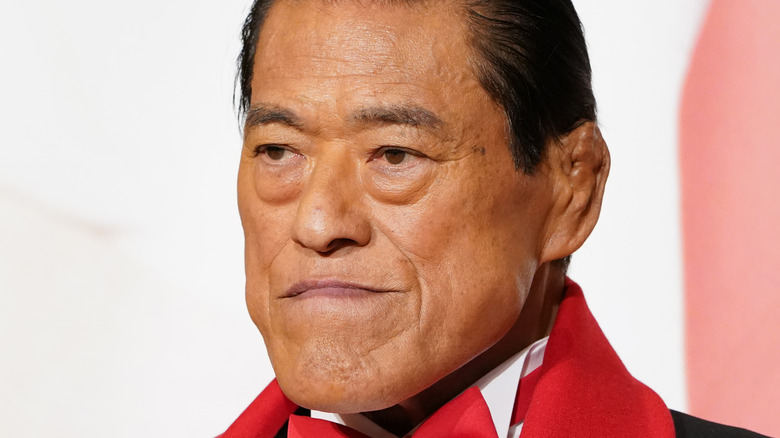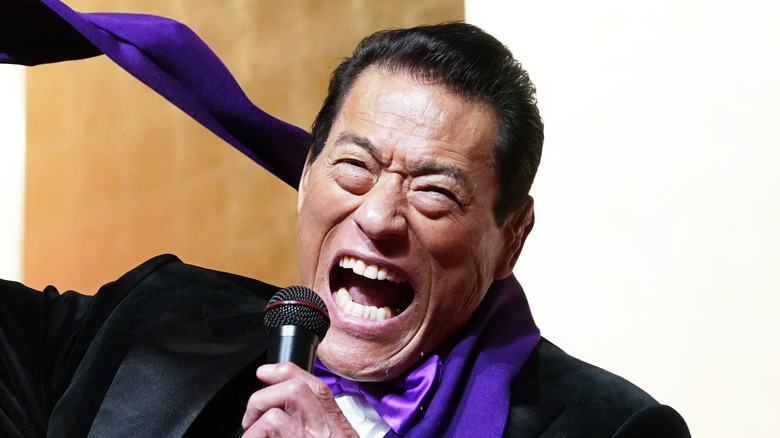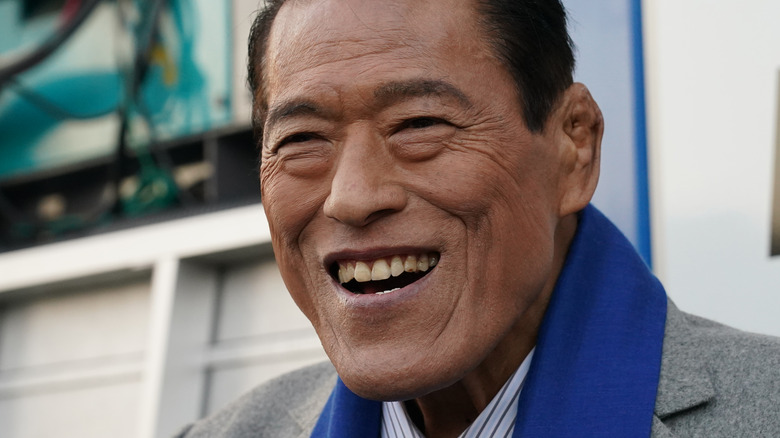Why Antonio Inoki's WWE Championship Reign Isn't Recognized By The Promotion
We may receive a commission on purchases made from links.
The late, great Antonio Inoki passed away in October 2022 from complications related to a rare disease called amyloidosis. He was 79 years old and had dedicated the majority of his life to elevating professional wrestling around the world, and specifically, to a level nobody had witnessed in Japan. He's considered the father of the "strong style" fighting technique, which Japanese wrestlers continue to execute in the modern era, while he was also the founder of Japan's most popular wrestling company, New Japan Pro-Wrestling.
His contributions were felt just as powerfully inside the squared circle, as he was a box office draw for several decades at the height of his in-ring career. Perhaps his most famous bout came in June 1976 at the Nippon Budokan arena in Tokyo, where he battled Muhammad Ali in a "War of the Worlds" match with special stipulations that restricted what wrestling moves were allowed. It was a controversial result as Inoki spent a large portion of the match down on his back, kicking at Ali while the world-renowned boxer urged him to get up and fight.
Controversy followed Inoki elsewhere in his career, including an incident involving the WWF Heavyweight Championship. Phantom title changes, where the historical records of the company don't give recognition to a title reign that happened, occurred back in the early years of NWA but only once in WWE history. Inoki was the centerpiece of that situation and, to this day, isn't rightfully given credit in the annals of WWE as the company's first Japanese-born World Champion.
Antonio Inoki wins the WWF title
In December 1979, a partnership between WWF and the developing NJPW opened the door for an international tour allowing top WWF stars to compete in front of Japanese fans. Bob Backlund, well-known for his wacky, intense character in the 90s, was portraying a more subdued, all-American working-class man in '79 and was the reigning WWF Champion. His participation in the tour allowed for significant matches to take place, including a WWF Championship defense against Antonio Inoki on November 30, 1979.
The near 30-minute bout ended in questionable fashion when Inoki became distracted by an incident at ringside with Tiger Jeet Singh, allowing Backlund to hit his signature atomic drop. Despite the referee's hand hitting the mat three times in succession, the bell didn't ring, and the match continued. Backlund began celebrating because he heard the three count and believed he retained the title, which gave Inoki the chance for a side suplex.
The referee hit a quick three count and the bell rang immediately and Inoki was announced as the new WWF Champion. He was given a ceremony where they placed the title belt around him and presented a big trophy to Inoki, all while Backlund contested how the finish of the bout went down. It's apparent that this was all part of the story they wanted to tell throughout the tour, but at the time, the confusion behind everything only fueled rumors of what happened.
The aftermath
A rematch was held on December 6, 1979, as the tour was wrapping up. This time, things would play out much differently. Bob Backlund would take advantage of a distracted referee and throw Antonio Inoki crotch-first onto the top rope for the victory. He returned to the United States the same way he left it, as WWF Champion, and since news from overseas rarely made it to America, it was easy for the company to act like nothing out of the ordinary occurred during the tour.
Company statistics say Backlund's reign continued for a total of 2,135 days – the second-longest WWE Championship reign behind Bruno Sammartino. In his 2015 book "Backlund: From All-American Boy to Professional Wrestling World Champion," Backlund shared insight into the decision to do the title switches. Part of the reason was to keep Inoki elevated on the same level as his heated rival Giant Baba in All Japan Pro-Wrestling, who also had a history of defeating major American stars like Harley Race.
It appeared the snub didn't affect the relationship Inoki had with WWE, further proving it was all planned to give the Japanese fans something special during the tour. It may not say WWF Champion in the history books, but it does specify that Inoki was a two-time WWF World Martial Arts Heavyweight Champion. He was inducted into the WWE Hall of Fame in 2010, adding to his legacy around the globe.


